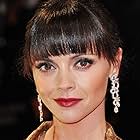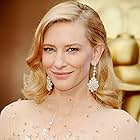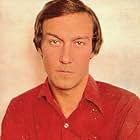A young refugee traveling from Russia to America in search of her lost father falls for a gypsy horseman.A young refugee traveling from Russia to America in search of her lost father falls for a gypsy horseman.A young refugee traveling from Russia to America in search of her lost father falls for a gypsy horseman.
- Awards
- 3 wins & 3 nominations
- Director
- Writers
- All cast & crew
- Production, box office & more at IMDbPro
Storyline
Did you know
- TriviaChristina Ricci and Johnny Depp found it strange and amusing to do sex scenes with each other because they first met when she was 9 and he was 26, when he visited the set of her debut film Mermaids (1990) to see his then-girlfriend Winona Ryder. She said during an interview with ABC News, "I've known Johnny so long, he's protective of me as an older brother and it's weird to think of having sex with him. So we know enough about each other to laugh at it. He said it was 'like we were rooting around together like pigs.' Anyway, I don't think you ever really deal with sexuality on-screen. There are, like, 50 people watching you, and you're just, like, 'Uh, I hope my ass looks good.' There's no deep feeling there. It's just embarrassing."
- GoofsIn the scene where Suzie is following Cesare and his friends on her bike, they go through a passage where you can see the Eiffel Tower in the background and it is lit up. However, the lights were not added to the Tower until 1986.
- SoundtracksJe crois entendre encore (Yiddish Version)
from "The Pearl Fishers"
by Georges Bizet
Performed by Salvatore Licitra and Orchestra of the Royal Opera House
Concertmaster Vasko Vassilev
Featured review
Although I agree with those who say that Sally Potter's THE MAN WHO CRIED doesn't entirely live up to her two previous works, I think that even so it is still a very good movie.
Apparently things are slowly starting to get better for THE MAN WHO CRIED. At least it has now been played in several countries in Europe other than Italy (like England, Germany and France) and its score and screenplay are finally being sold by Amazon.co.uk. (I'm hoping the VHS and DVD will soon be available also.) I want to contribute to this movie's current rebirth by saying what I think makes it special and definitely worth seeing.
The first thing that comes to my mind about THE MAN WHO CRIED is its formal visual beauty. It is extremely well directed and there are many scenes that I regard to be among the most beautiful ever filmed. Ms. Potter's talent as a film director is undeniable: her style is a mixture of choreographic elegance and subtle sensuality. I have never seen the camera move like it does in her pictures. In ORLANDO and in THE MAN WHO CRIED alike, it has a way of chasing the characters on scene, of playing with them, of circling around them, that makes it seem like an animated being rather than a mechanical object. It literally seems as if the camera dances with the characters it portrays! None of the movies by other directors I've seen so far are 'written' in this same 'language.' Ms. Potter's personal contribution to the renewal of the existing 'cinematographic grammar' shouldn't be underestimated.
A second striking quality of THE MAN WHO CRIED is the music in it. The director said that 'The intention was to find a way of telling the story where music was carrying emotional and spiritual truth with as much force as the images and the characters.' By frequently reiterating a set of intensely powerful, culturally eloquent and evocative pieces among others, Purcell's Dido's Lament, Bizet's Je Crois Entendre Encore and instrumental pieces by Goliov which serve to remind the characters who they are and where they come from (besides giving the movie cohesion), she succeeds in this difficult task brilliantly. (And courageously: not many film directors, I believe, would dare to make a movie with four opera pieces constantly being sung!) The idea that comes through is that when people are left without their cultural identity and/or dignity, music can save them for forgetting their 'Selves,' save them from silence and incommunicability.
As far as the characters in THE MAN WHO CRIED are concerned, I think they are very well thought out and effectively depicted. It is especially admirable that the director would decide to give life to a 'mute heroine,' Suzie-Fegele, who says almost nothing throughout the whole movie, but expresses herself surprisingly well in spite of this. She conveys, with incredible force, that sense of inadequateness and discomfort so many are left with for life when they are put into a hostile environment during their childhood. Cristina Ricci seems embarrassed at times, and rightly so, for in this movie she plays the part of an outcast, and that's the way an outcast often feels, unfortunately. But there's also strength in her eyes, and determination, and, once again, rightly so, for despite all that fate has unjustly taken away from her, she has learned to go on, to look straight ahead and not ever give in, to live and not to let herself die. Cate Blanchett is an exceptional actress and she performs wonderfully in this movie: both her beauty and intelligent eyes were never this intense and captivating. Johnny Depp is, as always, very talented and very handsome.
As I said at the beginning of my review, this movie isn't quite as good as ORLANDO and THE TANGO LESSON (which were, in my opinion, two absolute masterpieces). While those two movies were perfect from the very beginning to the very end, THE MAN WHO CRIED is perhaps a little uneven, in that along with many breathtaking and superb scenes there are a few instances in which something seems to be missing (overall I rate it 9/10). Also, I personally would have preferred for it to be as multilingual as it was multicultural (then again, I know this probably would have made the movie even less popular). Nonetheless I think THE MAN WHO CRIED has all the qualities of a good art product and I feel perhaps some haven't fully appreciated it because they weren't looking at it as one should look at 'poetry,' but rather as one normally looks at 'prose.' There's so much entailed in it, that needs to be interpreted, as with poetry. Sally Potter doesn't flaunt feelings, but they are there, and I guarantee they can stir you immensely if only you cooperate. Every minute of THE MAN WHO CRIED (which I have seen three times already) gave me something special to think about and remember, and movies don't do that to me very often. Consequently I think it would be a real pity for the public not to support this movie and its director. I think Sally Potter is one of the very best film makers around and I hope our support and enthusiasm will persuade her to do even better next time!
Apparently things are slowly starting to get better for THE MAN WHO CRIED. At least it has now been played in several countries in Europe other than Italy (like England, Germany and France) and its score and screenplay are finally being sold by Amazon.co.uk. (I'm hoping the VHS and DVD will soon be available also.) I want to contribute to this movie's current rebirth by saying what I think makes it special and definitely worth seeing.
The first thing that comes to my mind about THE MAN WHO CRIED is its formal visual beauty. It is extremely well directed and there are many scenes that I regard to be among the most beautiful ever filmed. Ms. Potter's talent as a film director is undeniable: her style is a mixture of choreographic elegance and subtle sensuality. I have never seen the camera move like it does in her pictures. In ORLANDO and in THE MAN WHO CRIED alike, it has a way of chasing the characters on scene, of playing with them, of circling around them, that makes it seem like an animated being rather than a mechanical object. It literally seems as if the camera dances with the characters it portrays! None of the movies by other directors I've seen so far are 'written' in this same 'language.' Ms. Potter's personal contribution to the renewal of the existing 'cinematographic grammar' shouldn't be underestimated.
A second striking quality of THE MAN WHO CRIED is the music in it. The director said that 'The intention was to find a way of telling the story where music was carrying emotional and spiritual truth with as much force as the images and the characters.' By frequently reiterating a set of intensely powerful, culturally eloquent and evocative pieces among others, Purcell's Dido's Lament, Bizet's Je Crois Entendre Encore and instrumental pieces by Goliov which serve to remind the characters who they are and where they come from (besides giving the movie cohesion), she succeeds in this difficult task brilliantly. (And courageously: not many film directors, I believe, would dare to make a movie with four opera pieces constantly being sung!) The idea that comes through is that when people are left without their cultural identity and/or dignity, music can save them for forgetting their 'Selves,' save them from silence and incommunicability.
As far as the characters in THE MAN WHO CRIED are concerned, I think they are very well thought out and effectively depicted. It is especially admirable that the director would decide to give life to a 'mute heroine,' Suzie-Fegele, who says almost nothing throughout the whole movie, but expresses herself surprisingly well in spite of this. She conveys, with incredible force, that sense of inadequateness and discomfort so many are left with for life when they are put into a hostile environment during their childhood. Cristina Ricci seems embarrassed at times, and rightly so, for in this movie she plays the part of an outcast, and that's the way an outcast often feels, unfortunately. But there's also strength in her eyes, and determination, and, once again, rightly so, for despite all that fate has unjustly taken away from her, she has learned to go on, to look straight ahead and not ever give in, to live and not to let herself die. Cate Blanchett is an exceptional actress and she performs wonderfully in this movie: both her beauty and intelligent eyes were never this intense and captivating. Johnny Depp is, as always, very talented and very handsome.
As I said at the beginning of my review, this movie isn't quite as good as ORLANDO and THE TANGO LESSON (which were, in my opinion, two absolute masterpieces). While those two movies were perfect from the very beginning to the very end, THE MAN WHO CRIED is perhaps a little uneven, in that along with many breathtaking and superb scenes there are a few instances in which something seems to be missing (overall I rate it 9/10). Also, I personally would have preferred for it to be as multilingual as it was multicultural (then again, I know this probably would have made the movie even less popular). Nonetheless I think THE MAN WHO CRIED has all the qualities of a good art product and I feel perhaps some haven't fully appreciated it because they weren't looking at it as one should look at 'poetry,' but rather as one normally looks at 'prose.' There's so much entailed in it, that needs to be interpreted, as with poetry. Sally Potter doesn't flaunt feelings, but they are there, and I guarantee they can stir you immensely if only you cooperate. Every minute of THE MAN WHO CRIED (which I have seen three times already) gave me something special to think about and remember, and movies don't do that to me very often. Consequently I think it would be a real pity for the public not to support this movie and its director. I think Sally Potter is one of the very best film makers around and I hope our support and enthusiasm will persuade her to do even better next time!
- How long is The Man Who Cried?Powered by Alexa
Details
- Release date
- Countries of origin
- Official site
- Languages
- Also known as
- Людина, яка плакала
- Filming locations
- Paris, France(on location)
- Production companies
- See more company credits at IMDbPro
Box office
- Gross US & Canada
- $747,092
- Opening weekend US & Canada
- $93,455
- May 27, 2001
- Gross worldwide
- $1,322,763
- Runtime1 hour 40 minutes
- Color
- Sound mix
- Aspect ratio
- 1.85 : 1
Contribute to this page
Suggest an edit or add missing content
















